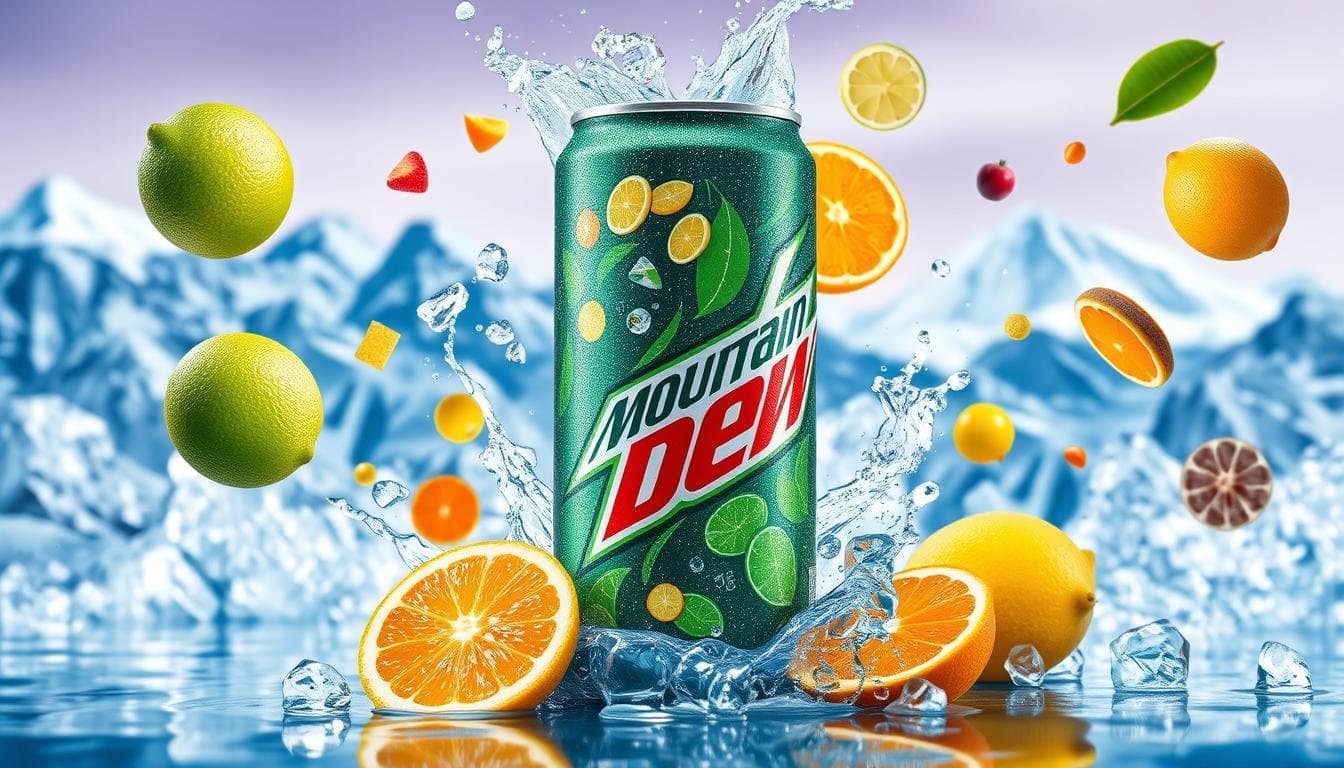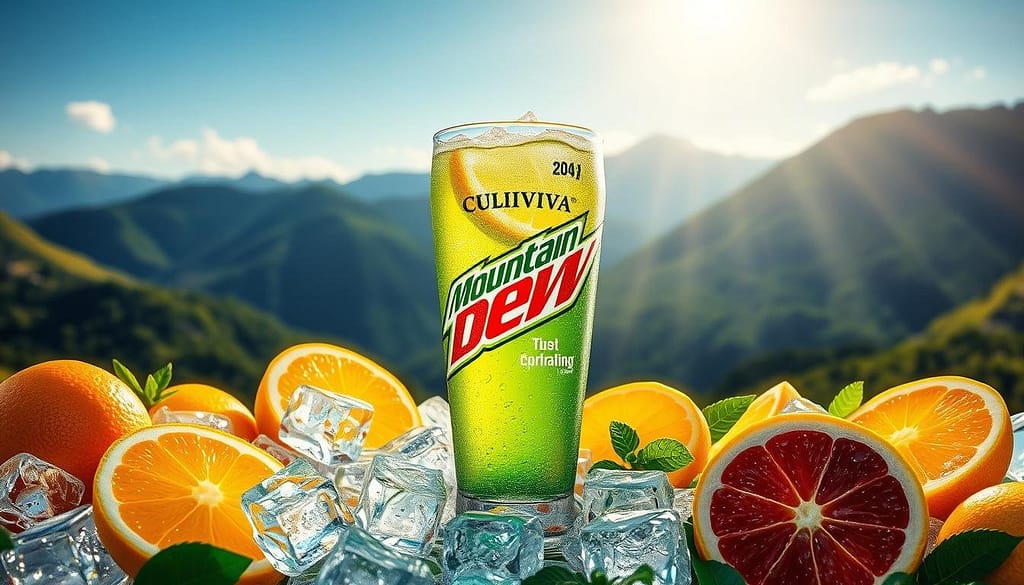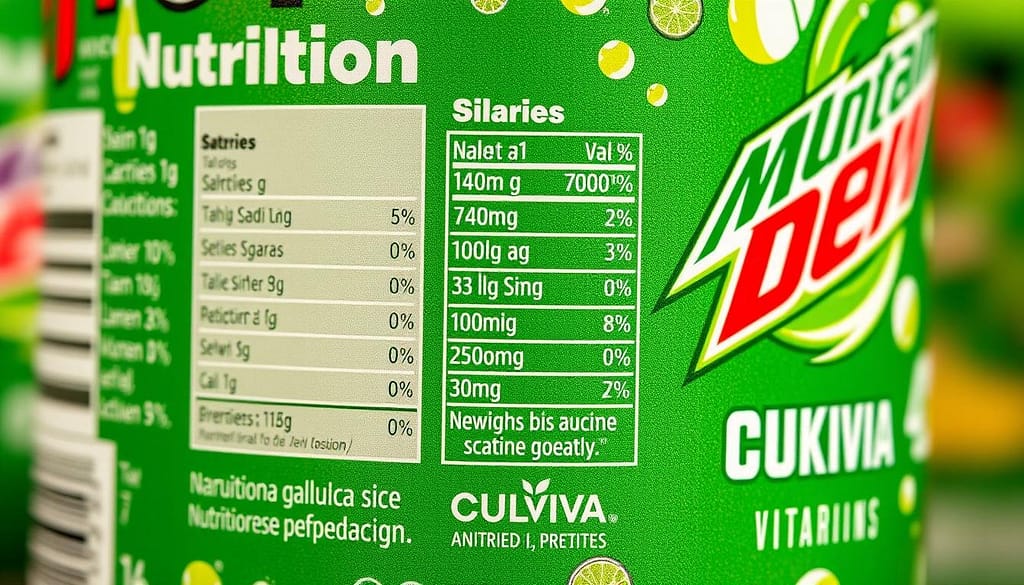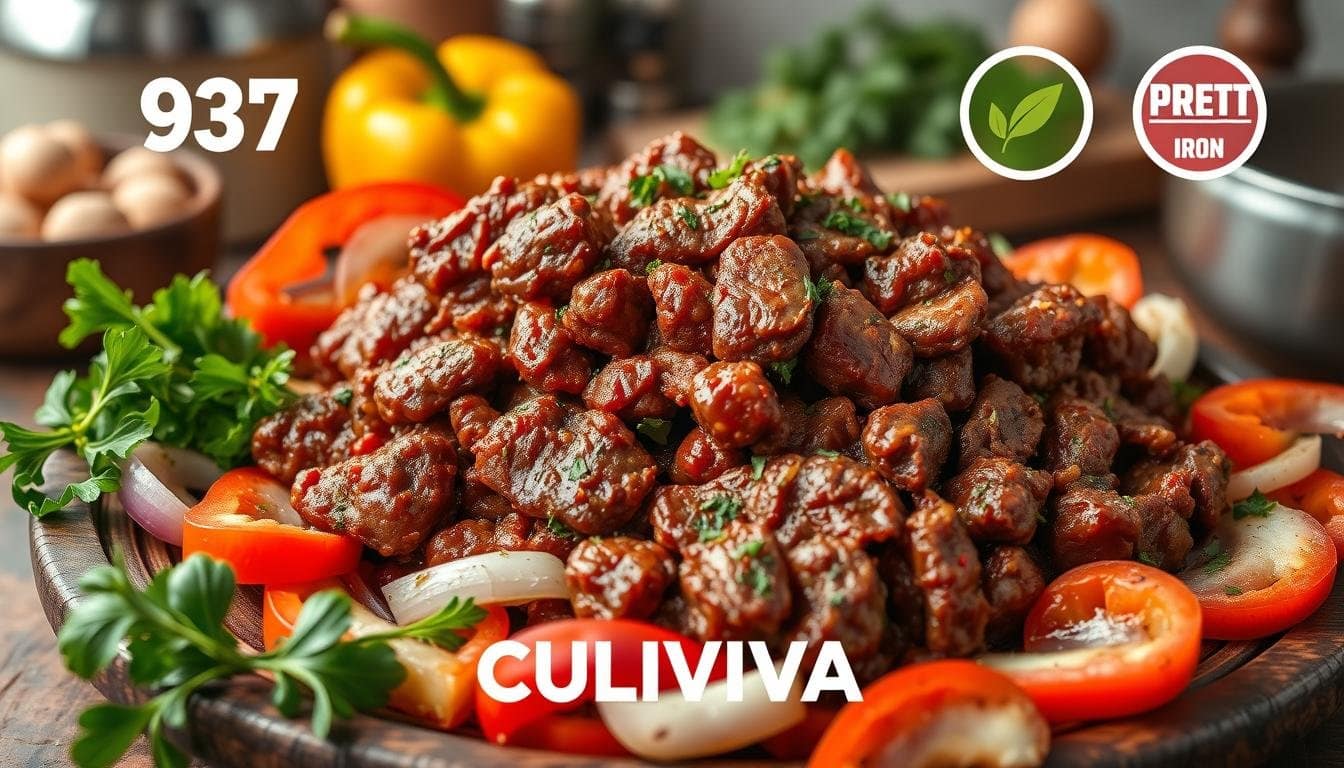Ever curious about what’s in your Mountain Dew? The bright green color and caffeine buzz are just the start. Let’s explore the nutrition facts and the secrets of Mountain Dew.
Key Takeaways
- A 20 oz Mountain Dew has 290 calories1
- It packs 77 grams of sugar, or 19 teaspoons1
- It gives you a big energy boost with 91 mg of caffeine1
- Mountain Dew has 105 mg of sodium1
- It’s fat-free, good for those watching their fat intake1
Contents
- 1 Understanding Mountain Dew’s Basic Nutritional Profile
- 2 Complete Mountain Dew Nutrition Facts Analysis
- 3 Sugar Content and High Fructose Corn Syrup
- 4 Sodium and Mineral Content
- 5 Artificial Ingredients and Additives
- 6 Caffeine Content and Stimulant Effects
- 7 Comparing Mountain Dew to Other Soft Drinks
- 8 Health Considerations and Daily Value Percentages
- 9 Understanding Mountain Dew Varieties and Their Variations
- 10 Conclusion
- 11 FAQ
Understanding Mountain Dew’s Basic Nutritional Profile
Mountain Dew is a well-known soft drink with a citrus flavor and lots of caffeine. Knowing its nutritional profile helps us make better food choices. Let’s explore the main points.
Calories and Serving Sizes
A 20-ounce bottle of Mountain Dew has 290 calories1. The usual serving size is 12 ounces, with 170 calories2.
Total Fat and Protein Content
Mountain Dew is high in calories but low in fat and protein. It has 0 grams of fat and protein per serving12.
Carbohydrate Breakdown
Most of Mountain Dew’s calories come from carbs. A 12-ounce serving has 46 grams of carbs, mostly from added sugars2. This is 17% of the daily carb value.
While Mountain Dew can fit into a balanced diet, its high calorie and sugar content should be noted. Choosing water and healthier drinks is better for staying hydrated and nourished.
Complete Mountain Dew Nutrition Facts Analysis
Mountain Dew is known for its bright green color and energy boost. It has raised questions about its nutritional value3. The Environmental Working Group (EWG) has done a detailed study on this popular drink.
A single serving of Mountain Dew packs 12 teaspoons of sugar3. This can harm your health if you drink too much. The EWG also found Yellow 5, a food additive of concern3.
On the bright side, Mountain Dew has almost no fat3. It’s good for those watching their fat intake. But, it’s high in carbs, making up 17.0% of its content3.
The drink’s mineral content is another point to consider. It has 3.0% sodium per serving3. This might be a problem for people with high blood pressure. High fructose corn syrup is the main sweetener, which has health concerns3.
Understanding Mountain Dew’s nutrition is important for your health. It’s vital to drink it in moderation. Being mindful of what you eat is always the best approach.
Sugar Content and High Fructose Corn Syrup
Mountain Dew is very sweet, thanks to high fructose corn syrup. A 20-ounce can has 73.7 grams of sugar, which is 147% of what we should have in a day4. This can harm our blood sugar and health.
Added Sugar Amounts
The Environmental Working Group (EWG) found that Mountain Dew has 12 teaspoons of sugar in one serving3. Most of this sugar comes from high fructose corn syrup. This is a big nutritional worry.
Daily Value Percentages
Mountain Dew also has a lot of carbs, with 74 grams in a 20-ounce can. This is 27% of what we should eat in a day4. It has 174 milligrams of sodium, which is 7% of our daily limit4. But, it has no protein, which is 0% of calories4.
Impact on Blood Sugar Levels
The high sugar and carbs in Mountain Dew can really affect our blood sugar. It can cause big spikes and drops, which can mess with our health. 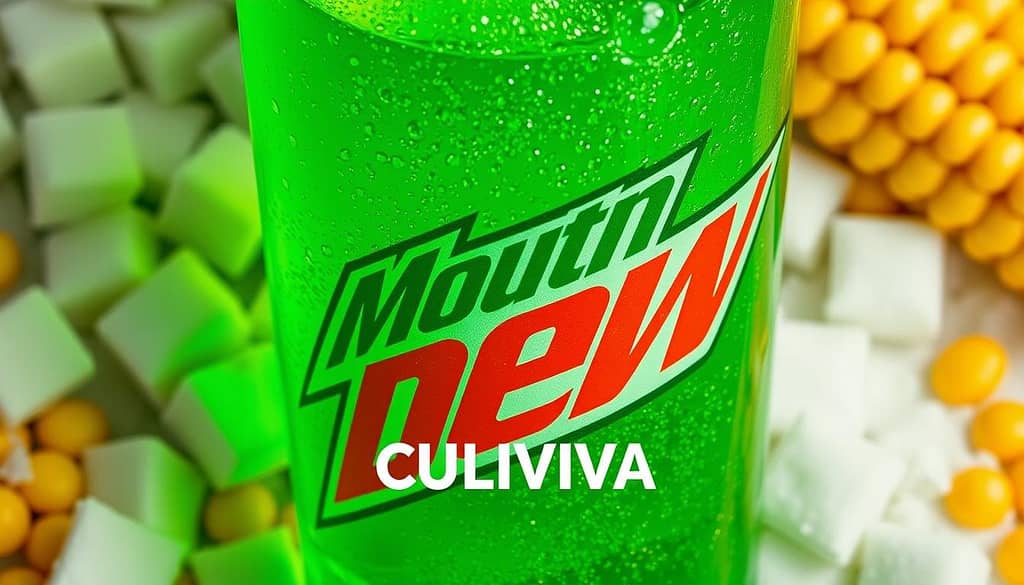
Sodium and Mineral Content
Mountain Dew is famous for its bold taste. But, its nutritional profile is more than just sugar and caffeine. It’s also important to look at its sodium content and mineral composition.
Each 248g serving of Mountain Dew AMP has 67mg of sodium. This is 3% of the daily recommended value5. While it’s not too much, watching your sodium intake is crucial, especially if you drink a lot of Mountain Dew.
Mountain Dew AMP also has minerals. It has 32.24mg of calcium, which is 2% of the daily value, and 0.05mg of iron, which is 1% of the daily requirement5. It also has a small amount of potassium, with 7.4mg per serving, contributing less than 1% of the recommended daily intake.
The protein content in Mountain Dew AMP is very low, at 0.6g per serving, which is 1% of the daily value5. It’s mostly made of carbohydrates, with 30g of total carbohydrates and 30g of sugar per 248g serving.
Even though Mountain Dew’s mineral content is not as high as some other drinks, it’s vital to think about its overall nutritional impact. Enjoying Mountain Dew in moderation is key to a healthy lifestyle5.
Artificial Ingredients and Additives
Mountain Dew contains some artificial additives and preservatives. It has Yellow 5, a food coloring that the Environmental Working Group (EWG) lists as a top concern6. It also includes sodium benzoate, a preservative with moderate to lower concerns, according to the EWG6.
Natural and Artificial Flavors
Mountain Dew also has natural and artificial flavors. The exact makeup of these flavors is not shared. This might be a worry for those who watch their health6.
Artificial Sweeteners in Diet Mountain Dew
Diet Mountain Dew is a lower-calorie option. It uses artificial sweeteners like aspartame, sucralose, and erythritol instead of sugar7. But, these sweeteners might cause health issues like migraines and heart problems, some studies suggest6.
There are better choices than Mountain Dew. For example, Oobli’s fruity sweet iced tea has only 7 grams of natural sugar per 16-ounce can. It’s sweetened with proteins from tropical fruits7.
Choosing what you drink is important. Knowing about the artificial additives in Mountain Dew helps you make better choices786.
Caffeine Content and Stimulant Effects
Mountain Dew is known for its energizing effects, thanks to its caffeine. The exact amount in Mountain Dew isn’t listed, but it’s clear it has a strong stimulant effect9.
A 12-ounce can of Mountain Dew has about 55 milligrams of caffeine9. This is similar to what you’d find in a cup of coffee or an espresso shot. So, Mountain Dew is a strong source of caffeine9.
The caffeine in drinks can vary a lot. Some energy drinks have up to 505 milligrams per serving. This is way more than what the FDA suggests for soft drinks10.
Caffeine’s effects are felt quickly, usually in 15-45 minutes. It blocks a neurotransmitter that makes us sleepy, making us more alert and awake. But too much caffeine can cause jitters, anxiety, and trouble sleeping9.
It’s crucial to watch how much caffeine we drink, especially with Mountain Dew. Healthy adults should not have more than 400 milligrams of caffeine a day. Pregnant women and kids should drink even less9.
Comparing Mountain Dew to Other Soft Drinks
Looking at Mountain Dew’s nutrition, it’s good to compare it with other popular drinks. Mountain Dew has 174 calories in a 12 oz serving11. This is more than many other carbonated drinks. For example, Coca-Cola Classic has 155 calories in a 12 oz serving11. Fanta Orange has 179 calories in the same size11. Sierra Mist, however, has only 90 calories in a 12 oz serving11.
Nutritional Differences
Mountain Dew’s nutrition is different from other soft drinks. Energy drinks like Red Bull and Monster have 220 to 298 calories in a 16 oz can11. Clear sodas, like Sprite, have fewer calories, with 151 in a 12 oz serving11. Diet sodas, like Diet Coca-Cola, have 0 calories11.
Caloric Impact
The high calorie and sugar in Mountain Dew can affect your diet. It has more calories than many other soft drinks.
“Drinking too much sugary, calorie-rich drinks like Mountain Dew can lead to weight gain and health problems if not balanced with a healthy diet.”
It’s key to think about Mountain Dew’s calories when choosing drinks. This helps make better choices for your health.
Health Considerations and Daily Value Percentages
Mountain Dew is a favorite drink for many, but it has health concerns12. It has a lot of added sugar, which can lead to weight gain and diseases like type 2 diabetes12. A 12-ounce can has 46 grams of sugar, more than the daily limit for both men and women13.
Mountain Dew gives you 17% of your daily carbs and 3% of sodium12. But it has little fat or protein, making it not great for a healthy diet13.
It also has artificial additives like yellow 5 and sodium benzoate, which might affect your health12. While studies are ongoing, it’s wise to watch out for drinks with lots of sugar and artificial stuff12.
It’s key to think about Mountain Dew’s health effects and drink it in small amounts. Drinking more water and healthy drinks can help your health12.
Understanding Mountain Dew Varieties and Their Variations
Mountain Dew, the iconic citrus-flavored soda, has grown a lot since 1940. The brand now offers many flavored variants to meet different tastes14. You can find everything from the classic Diet Mountain Dew to unique flavors like Baja Blast and Voo-Dew.
Diet Mountain Dew Options
Diet Mountain Dew was introduced in 1988 as a low-calorie option14. It replaced the old “Sugar Free Mountain Dew.” The diet version has changed a lot, especially in 2006 when it got a big update14.
Limited Edition Flavors
Mountain Dew has also released special flavors that excite fans1415. For example, there’s Merry Mash-Up, a Cranberry Pomegranate flavor15. Another hit was Flamin’ Hot, which sold out fast15. They also have mystery flavors like Voo-Dew, a tradition before Halloween14.
The Mountain Dew lineup keeps getting new and exciting flavors1415. Whether you love the classic citrus or the adventurous limited-time flavors, there’s something for everyone.
Conclusion
Knowing the mountain dew nutrition facts is key to making smart beverage choices. Mountain Dew has a lot of sugar, artificial stuff, and not much good for you. It’s popular, with a big share of the U.S. soft drink market16. This makes it important to know what’s in it.
Mountain Dew has been around since the 1940s16. It has changed, with new flavors like Diet and Cherry Code Red16. But, its main ingredients are still a worry. A 12 fl oz can has 54 mg of caffeine16. Too much can be bad. Plus, it has artificial colors and preservatives16.
We should think about what we drink. Mountain Dew might be tasty, but knowing its facts helps us choose better. This way, we can stay healthy and feel good.

